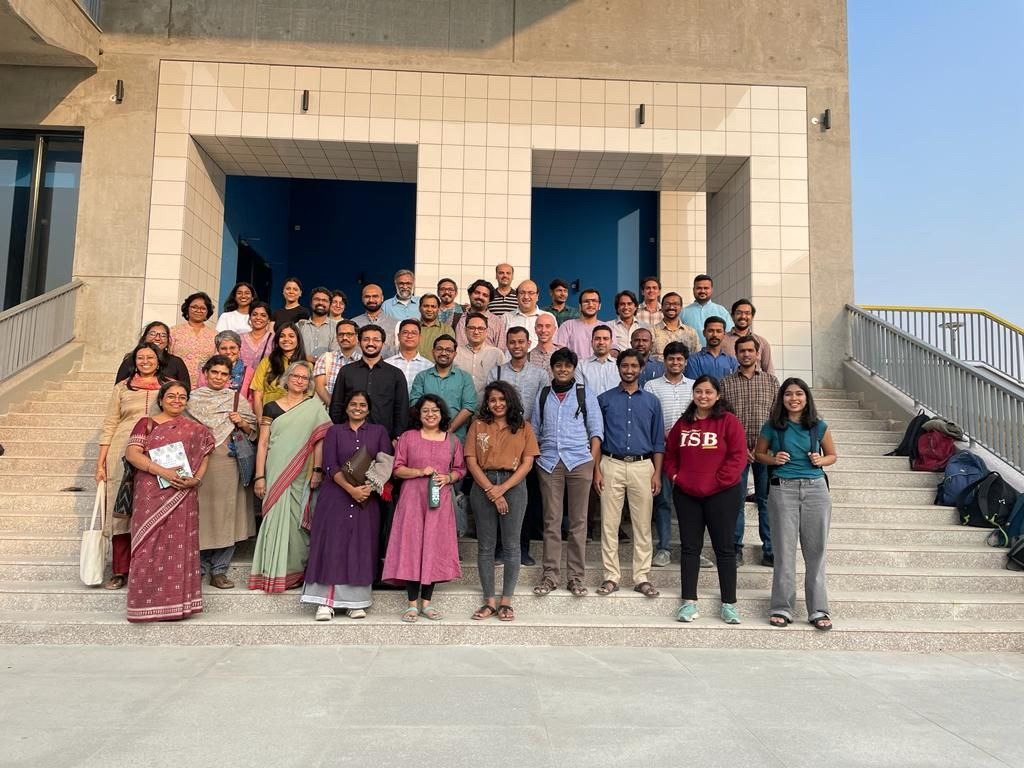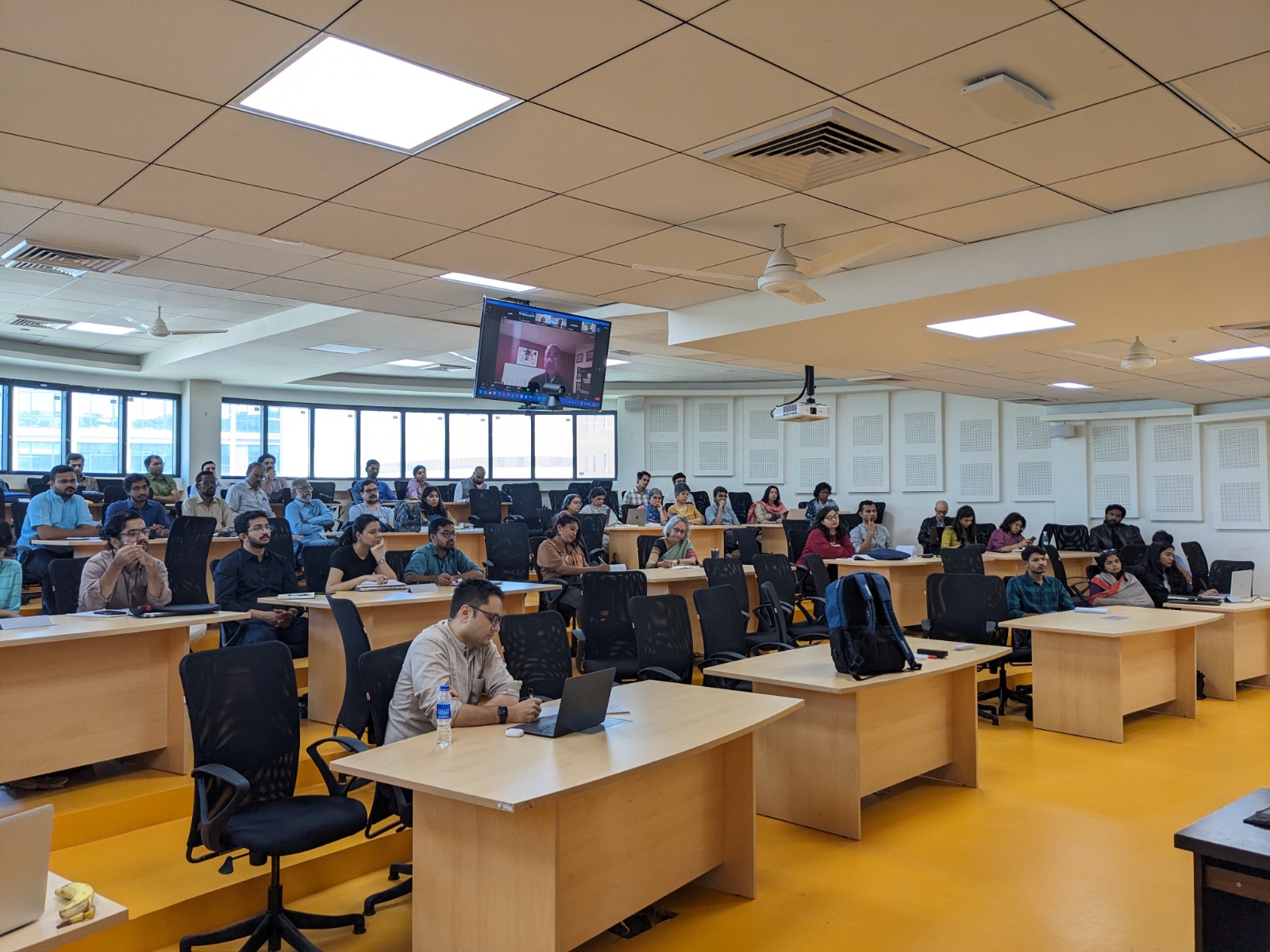Pathways of STS In India: A Workshop Report
Anushree Gupta, Thomson Chakramakkil, Yogita Suresh01/17/2024 | Report-backs
The Science and Technology Studies India Network (STS-IN) held its inaugural workshop titled “Pathways of STS: Where We Come From and Where We (Can) Go” at the Indian Institute of Technology, Hyderabad on December 14 and 15, 2023. Graduate students, researchers, and faculty members working on themes related to STS from across the country attended the workshop.

Participants at the STS India Network Workshop [image credit: Richa Kumar]
STS scholarship in India has historically been fragmented across the various Humanities and Social Sciences (HSS) and other interdisciplinary departments in Indian universities, lacking a formal infrastructure. However, scholars have made significant contributions to the analysis of science and technology as social institutions that are historically constitutive and in turn, constituted and mediated by political, cultural, and economic institutions. The network was envisioned as a space that fosters STS teaching, learning, and collaboration, along with supporting intensive research, organizing workshops, conferences, and reading/writing groups, among other activities.
Day 1: Getting Acquainted with the Domain and its People
The meeting kickstarted with the organizing committee members Aalok Khandekar and Naveen Thayyil welcoming the participants. They invited the participants to help craft a shared space for STS scholarship in India by contributing to the conversations in the upcoming sessions. Usha Raman moderated the first roundtable session and set the tone for the conversations to follow. Scholars including Deepak Kumar, Madhulika Banerjee, Shiju Sam Varghese, Aswathy Raveendran, and Radhika Krishnan narrated anecdotes from their academic journeys, underlining essential entanglements between the development history of India and critical moments of scientific and technological advancements. These narratives not only painted an evolutionary picture of the field but also served as instructive examples highlighting the strengths and flexibility that STS offers. The speakers discussed the need for STS scholarship to be in conversation with social movements while also making a cautious case for evaluating what counts as "legitimate" science or "good" technology and what perspectives are included or excluded in the pedagogies of these fields. Importantly, speakers stressed the importance of contextual considerations while developing STS scholarship.
They also discussed the methodological possibilities of doing a genealogy of STS in India. The discussion considered how to include the contributions of civil society, grassroots imaginations of science, feminist perspectives in studying diverse epistemic cultures and the material culture of technological artefacts. The roundtable concluded with contemplations about the critical role of STS as a discipline in preserving democratic ideals that counter hegemonic and obfuscatory narratives.
Day 2: Collaboration and Future Plans
The second day began with a hybrid panel titled “Building Collaborative STS Infrastructures from Near and Far." In this session, Rohit Negi moderated a conversation between scholars who work on STS themes from around the world. The panel consisted of Banu Subramaniam, Rohan D’Souza, Amit Prasad, Govind Gopakumar, and Nasima Selim. While commenting on the challenges confronted by global STS in general and South Asian STS in particular, the panel discussed the unique fecundity of STS-inflected scholarship as a boundary object that bridges conversations between Social Science and STEM disciplines. The panel also called attention to the pragmatic and pedagogical challenges coalescing around the “amorphousness” of STS. They shared their concerns about how STS in India has been removed from its connections to grassroots movements. In response to the questions and comments from the audience, the panel emphasized the need for more de-colonial perspectives and geographical diversity in building STS knowledge infrastructures, regardless of location.

Hybrid Session on Day 2 [image credit: Mahendra Shahare]
The panel titled “Making the Network Work for Us: Perspectives from Doctoral Scholars” gathered the perspectives and opinions of graduate students and early career researchers. This exercise was aimed at building a cohort within the network that would primarily help support early career research in the field. Graduate students talked about how they got involved in STS research and the complexities of working on STS-related themes in other disciplinary departments. Further, the panel discussed problems related to understanding complex social science theories, funding, STS methodology, access to research papers and books, academic writing, travel grants, collaborations, and publishing. The panel also reflected on the importance of building an STS scholarship that challenges the power and privilege embedded in the exercises of science and technology. The panel discussion concluded by discussing solutions that can aid doctoral students’ research alongside building a more relevant base for STS scholarship in India. The list of suggestions included creating an online repository of literature, conducting writing/reading workshops on STS concepts and methodology, and establishing independent student-run city chapters in different cities to organize lectures, discussions and other such in-person or hybrid events.
The final panel discussion on the second day attempted to chart future pathways for STS research in India. Moderated by Usha Raman, participants discussed a range of issues about the study of scientific and technological practices across various sectors of the economy, within policy-making and governance regimes, as well as in devising new collaborative approaches for knowledge production, whether in the classroom or the field. Speakers included Raghava Reddy, Arjun Ghosh, Annapurna Mamidipudi, Pankaj Sekhsaria, Janaki Srinivasan, and Richa Kumar, all of whom suggested ways to expand the scope of STS research while capitalizing on its critical strengths. They drew on interventions within agriculture science, technology governance, information science, digital humanities and livelihoods development. Discussants described creative approaches to comprehend and document the thick entanglements between science, technology, and society in these areas and beyond. The panel offered a productive re-imagination of what STS scholarship can accomplish, as speakers outlined their disciplinary trajectories to integrate productively heterogeneous perspectives, diverse disciplinary curiosities, and various epistemological orientations.
The closing session was a discussion around forming an organizational structure that could scaffold the efforts and ideas that were discussed over the two days. An interim executive committee was formed to jumpstart the activities of the network such as organizing a biannual conference, launching a mentorship program for students and early career academics, conducting online and offline seminars and workshops, and building a digital, institutional, and financial infrastructure for future activities. The network resolved to work on the tension between South Asia and India as the appropriate framing for the network’s activities, without appropriating the scholarship from other parts of South Asia. To facilitate immediate academic collaboration and create indicative themes for the reading groups, the following four sub-themes were suggested: Feminist STS, Digital STS, Climate/Energy/Environment STS and History of Science and Technology. Lastly, city chapters of the network were established in five cities - Delhi, Mumbai, Bangalore, Hyderabad, Chennai/Pondicherry. In this inaugural workshop, the STS India Network set the foundation for an academic community that can become the cornerstone of the STS research landscape in India.
Anushree Gupta is a PhD scholar at the Department of Liberal Arts at IIT Hyderabad. Through her research, she examines various intersections between digital technologies, labor and the urban condition, with a feminist lens. Her doctoral thesis explores emergent networked imaginaries, platformisation trajectories and forms of technology mediated work in the wake of the COVID-19 pandemic in Hyderabad, India.
Thomson Chakramakkil is a PhD candidate at the Department of Humanities and Social Sciences, IIT Delhi. He is also a Visiting Fellow under the “Digital Technologies and Democracy” initiative at the Centre for the Study of Developing Societies (CSDS), New Delhi.
Yogita Suresh is a graduate student at the Department of Sociology, Shiv Nadar University, Delhi NCR. Her research interests include Science and Technology Studies, Education, Engineering Studies and Feminist praxis.
Published: 01/17/2024
